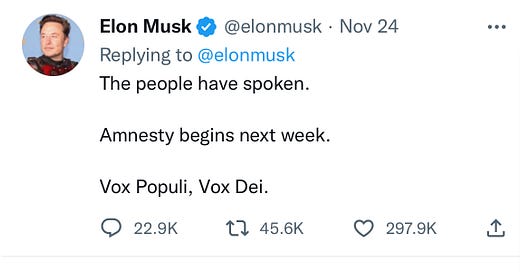The good and the bad of Elon Musk's first 40 days owning Twitter
He's grappling with his own vision for free speech - and pressure from advertisers and Europe. He would be better off sticking to First (Amendment) principles. Then again, it's not my $44 billion.
For a glorious moment two weeks ago, Elon Musk seemed to remember why he had bought Twitter.
On Nov. 23, Twitter said it would stop enforcing its Covid “misinformation” policies. Those rules had led it to ban thousands of users, including me in August 2021. (Among the tweets that led to my ban was one that simply reported accurately on the results of Pfi…
Keep reading with a 7-day free trial
Subscribe to Unreported Truths to keep reading this post and get 7 days of free access to the full post archives.



